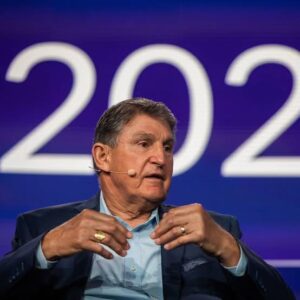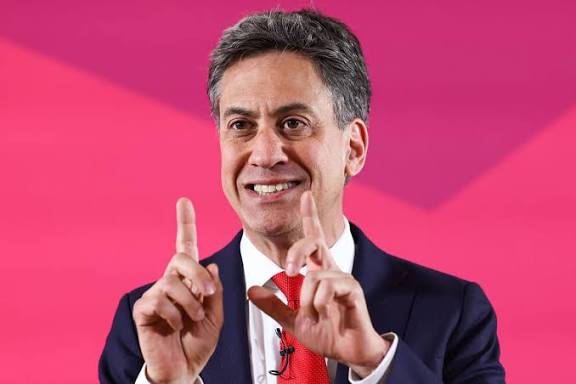Joe Manchin Breaks Away: Why He Left the Democratic Party

Former Sen Joe Manchin (I-W..VA) is out of the title “Dead Center” with a new book on Tuesday. Manchin is starting a media blitz. Today we will discuss about Joe Manchin Breaks Away: Why He Left the Democratic Party
Joe Manchin Breaks Away: Why He Left the Democratic Party
Joe Manchin’s decision to formally leave the Democratic Party in May 2024 marked one of the more dramatic shifts in recent U.S. political history. A senator from West Virginia long known as a centrist or conservative Democrat, Manchin’s move to register as an Independent (while continuing to caucus with Democrats) has raised questions about what drove the change, what it signifies for U.S. politics, and what his own motivations and constraints were. In this article, we trace his trajectory: his ideological roots, the pressures he faced, his public reasoning, strategic opportunity, and what his departure tells us about the current state of American political parties.
Early Life, Political Identity, and Context

To understand why Manchin broke away, it helps to start with his background.
West Virginia roots: Manchin hails from a state that has trended Republican in recent years. Once solidly Democratic, especially at local levels, West Virginia has shifted sharply in presidential, Senate, and gubernatorial elections. Manchin’s political survival depended on appealing to more conservative and moderate voters.
Moderate Democrat: Over his political career, Manchin has often positioned himself as a centrist. He supported some pieces of major Democratic legislation (infrastructure bills, climate and energy policy like the CHIPS and Science Act or Inflation Reduction Act) but repeatedly voiced concerns about fiscal discipline, regulation, energy policy (especially coal and traditional energy sources), and what he perceived as overreach on social issues.
Political tensions in national Democratic Party: The party has, over the last decade, moved in ways that emphasize progressive priorities on climate, social justice (including LGBTQ+ issues, DEI policies), and more aggressive regulatory and environmental policies. For someone like Manchin, these shifts created friction.
Key Turning Points
There were multiple instances and signals before his decision to leave, which indicate a gradual build-up rather than an abrupt rupture.
Policy clashes and refusal to go along
Manchin often balked at legislation or internal party expectations when he saw them moving too far from his sense of what was practical or beneficial for his constituents. For example, he pushed back on parts of the Build Back Better agenda, on energy transition, and on reducing or abolishing the Senate filibuster.Public criticism of party direction
Over time, Manchin’s rhetoric became more forthright. He publicly complained about partisanship, the polarization of parties, and the tendency of both parties to “leave people behind.” He also criticized progressives within the Democratic Party for focusing on what he called “telling people what to do” or “how to live their lives,” rather than focusing on jobs, wages, etc. For Manchin, the “brand” of the Democratic Party had become problematic.Electoral and demographic pressures
West Virginia has become more reliably Republican in national elections. For someone with statewide ambitions (or considerations of leaving the Senate, running for governor, or maintaining political influence), aligning too closely with a party increasingly out of favor in his state comes with risks. The “D” label has, in West Virginia, carried increasing liability. Manchin has recognized that.Strategic timing
His announcement came in May 2024, a time by which candidate filing deadlines, political momentum, and electoral calculations become more urgent. By registering as an Independent, without party affiliation, Manchin preserved maximum strategic flexibility. He has already announced he would not seek re-election to the Senate in 2024, which frees him in ways many politicians are not. This gives him more leeway to reposition himself.
Manchin’s Public Reasons for Leaving
When Manchin officially left the Democratic Party, his statements laid out a number of reasons. Some are more rhetorical, others more practical. Here are the primary ones:
Partisan extremism
Manchin said both parties have embraced “partisan extremism.” He argued the nation is being left behind by both Democrats and Republicans, who are prioritizing extremes over compromise. He claimed politics are “broken,” and that neither party is willing to seek common ground.“Toxic” brand of the Democratic Party
In interviews, Manchin described the Democratic Party’s brand as “toxic,” especially nationally. He said he no longer recognized the Democratic Party he grew up with, that the party had changed in ways that he could not align with.Desire to put “country before party”
Manchin consistently invoked a theme of identity beyond party. He said that his first duty was to do what is best for his state and the country, rather than answer to a party line or partisan loyalty. This fits his long history of voting across party lines when he believes it necessary.Concerns over policy overreach and cultural/social issues
He criticized parts of the party he saw as demanding adherence to social or cultural orthodoxies—where the divergences between individual belief or regional values clash with national progressive narratives. Examples include debates over transgender rights, DEI (diversity, equity, inclusion) policies, and what he perceives as social issue “dictates.” He also criticized what he saw as overregulation or too rapid environmental transitions that neglect energy realities in places like West Virginia.
Constraints & What Manchin Could Not (or Would Not) Do
Manchin’s departure was not a full ideological reset, and there are constraints that limited how far he could go—both from his own perspective and from institutional realities.
Caucusing with Democrats: Though he left the party, he remains in the Senate Democratic Caucus. That allows him to keep committee assignments, maintain influence, and preserve some institutional leverage.
No major third-party bid: Manchin explored, or at least flirted with, the idea of a third-party movement or working with centrist coalitions (e.g. “No Labels”), but he ultimately did not launch a third‐party presidential run. He has said he did not want to be a “spoiler.”
Electoral risk: Given West Virginia’s political leanings, leaving the Democratic label carries risk. While registering as independent may reduce the perceived penalty from national Democratic association, going further into Republican territory might alienate certain base voters, even while trying to appeal to moderates and cross‐party constituents.
Legacy and relationships: Manchin has spent decades working within the Democratic fold—holding positions, developing relationships, accruing seniority, and gaining influence. Severing affiliation fully risks losing some of that history and those institutional anchors.
Implications & Possible Motivations Behind the Move
Beyond what Manchin says, there are plausible strategic, ideological, and political reasons that make this shift “rational” from his perspective. Here are some:
Rebranding
By shedding the “Democrat” label, or modifying how he is perceived, Manchin can appeal more broadly to disaffected voters—moderates, independents, even some Republicans—especially in a polarized environment where partisanship is a liability. The “Independent” label allows him more rhetorical freedom.Legacy & Post‐Senate Plans
Since Manchin announced he would not seek re-election in 2024, leaving the party might be part of shaping his post‑political legacy—being remembered as someone who put country over party, who resisted polarization, instead of just being a centrist Democrat who occasionally broke with party lines. It might also give him options beyond the Senate—advisory roles, speaking, possibly non‐profit or private sector work that values bipartisan or non‑partisan credibility.Influence even in departure
Even as an Independent who caucuses with Democrats, his endorsement, voice, and votes still carry weight. By positioning himself as somewhat external, he may feel he can have more leverage in debates, less bound by party pressure or internal expectations. He can call out extremes on both sides with greater moral credibility.Responding to constituent realities
West Virginia’s electorate has moved significantly to the right in national voting. Voters may support policies that align more with conservative values—on energy, culture, government regulation. Manchin has often emphasized his home‑state interests, especially regarding coal, traditional energy, and economic concerns. Aligning with the Democratic Party’s progressive shifts may have become more of a liability locally than an asset.Frustration with internal party dynamics
Manchin’s public statements indicate dissatisfaction with how the national Democratic Party operates: its internal discipline, its focus on identity or culture issues, its perceived intolerance of dissent or centrism, and its legislative priorities. These frustrations accumulate and contribute to a tipping point.
What He Has Not Done & What Remains Unclear
While many of Manchin’s motivations are clear, some things remain less certain or unresolved, which are important in understanding the full picture.
Future electoral running: Even though he left the party and will not run for Senate re‑election in 2024, it remains to be seen whether he will run for another office (e.g. governor), or take on some other political role. Changing party affiliation could be a step toward that, but nothing definitive has been announced.
How far the ideological shift is: While he has criticized parts of the Democratic platform, how much Manchin aligns with Republican positions, or whether his positions will shift more conservatively over time, is not fully determined.
Impact on national politics and party dynamics: It is uncertain how much Manchin’s departure will contribute to broader shifts—whether it will encourage more centrists to follow, alter how the Democratic Party calibrates its message, or change legislative dynamics meaningfully.
Political calculations beyond 2024: Since Manchin is not running for re‑election to the Senate, what comes after (his own role or influence) might shape how he behaves as an Independent. If he has no immediate ambition for another office, then his decisions may be more about legacy and influence than electoral survival.
Broader Significance
Manchin’s breakaway is more than personal—it reflects larger trends and tensions in U.S. politics.
Polarization & the shrinking center
One of the recurring complaints from Manchin is that both parties have moved toward ideological extremes, leaving moderates in the middle squeezed or ignored. His shift underscores the anxiety among centrists and independent voters, who feel alienated by what they see as partisan purity tests on both sides.Changing party identity & “brand risk”
Parties evolve. The Democratic Party under recent leaders has emphasized progressive social issues, climate change action, equity, and structural reforms. While many support these, others feel that the party has become less tolerant of dissent or variation—especially from regions that are more conservative socially or economically. Manchin’s departure signals that the national party’s identity changes can carry real political cost.Institutional norms & compromise
Manchin often speaks of “common sense,” compromise, bipartisanship. His leaving suggests that norms of compromise are eroding, or at least that some elected officials believe they are no longer tenable within existing party structures. The functional consequences—how legislation gets passed, how parties negotiate or resist internal dissent—will be significantly affected.Electoral implications
In states like West Virginia, Manchin’s shift may presage realignment. Voters may increasingly vote straight ticket Republican, making it harder for any Democrat in statewide races. For the Democratic Party, losses in such areas heighten the importance of maintaining strength in urban and suburban districts. For national electoral strategy, Manchin’s move may be a warning about overreliance on certain coalitions or compression of policy diversity.Precedent & signaling to other moderates
Manchin is not the only politician in recent years to leave his party in part over ideological mismatch or disagreement with the national party’s direction (Kyrsten Sinema is another example). His move may embolden others, or at least encourage them to explore similar paths.
Criticisms, Risks, and Counterarguments
No political move comes without costs or criticisms. Manchin’s departure has drawn reactions, and there are risks inherent in his choice.
Perception of opportunism: Critics may view his exit as opportunistic rather than principled—e.g., seeking relevance, avoiding blame, or building a future brand. Some may question whether his statements about extremism are sincere or strategically timed.
Reduced influence: Even though Manchin will caucus with Democrats, leaving the party formally may reduce his ability to shape party strategy, set the agenda, or affect internal deliberations in the way party insiders do.
Alienating former allies: Excusing the Democratic Party may alienate those in his network. It may also reduce support from Democratic-leaning donors, volunteers, or voters who may feel betrayed or distrustful of his commitment.
Limited upside in deeply polarized electorate: While some voters love the idea of independents or political outsiders, many others vote strictly along party lines. The benefit of being independent may be muted if the electorate continues to polarize.
Legacy trade-offs: Leaving the party could complicate how future historians or political commentators view his legacy. Is he a moderate voice standing up to excess, or is he a deserter from his party? Those framing choices matter.
What He Has Achieved & What Remains to Be Seen
On the one hand, Manchin’s move is symbolically powerful; on the other, its material effects are yet to be fully felt.
Symbolic disruption: Publicly registering as Independent, his rhetoric about extremes, toxicity, and party identity have injected fresh urgency into debates about party realignment, polarization, centrism, and what it means to represent constituents in places that are socially or economically divergent from national party orthodoxy.
Policy leverage preserved: Because he continues to caucus with Democrats, he retains significant institutional influence, especially given how slim majorities can be in the Senate. Thus, his departure hasn’t immediately cost him formal influence.
Shifts in messaging & party calculation: The Democratic Party, aware of losing moderates, may adjust messaging or policy priorities to avoid further defections or to appeal to the center. Similarly, Republicans may try to co-opt or court voters who feel abandoned by the Democratic Party.
Electoral outcomes: The 2024 elections, especially in West Virginia and other states with moderate or swing dynamics, will test how voters react to Manchin’s rebranding. His retirement from Senate means that seat will be contested without him, which gives a clean slate in some ways—but also removes the moderating influence he’s brought.
Conclusion
Joe Manchin’s departure from the Democratic Party can be seen as the culmination of longstanding tensions: between his centrist impulses and a party increasingly emphasizing progressive agendas; between the imperative to serve a conservative-leaning home state and the expectations of a national party coalition; between institutional loyalty and personal or ideological discontent. His move to register as an Independent is both a personal statement and a reflection of larger fractures in American politics.
Whether this signals a broader realignment or remains a high-profile outlier depends on how both parties respond, how Manchin’s political future evolves, and how voters—especially moderates and independents—perceive party identity. For now, Manchin’s breakaway underscores how political labels, once stable, are increasingly contested terrain.
How useful was this post?
Click on a star to rate it!
Average rating 0 / 5. Vote count: 0
No votes so far! Be the first to rate this post.
About the Author
usa5911.com
Administrator
Hi, I’m Gurdeep Singh, a professional content writer from India with over 3 years of experience in the field. I specialize in covering U.S. politics, delivering timely and engaging content tailored specifically for an American audience. Along with my dedicated team, we track and report on all the latest political trends, news, and in-depth analysis shaping the United States today. Our goal is to provide clear, factual, and compelling content that keeps readers informed and engaged with the ever-changing political landscape.




